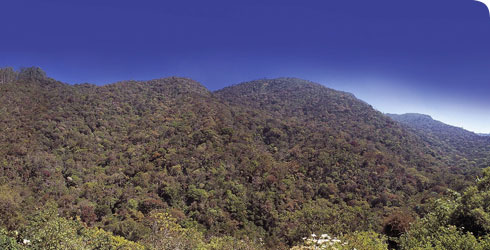What causes climate change?
There are many factors that affect climate. Our atmosphere is one of them and when it changes this has an effect on Earth's average temperature.
Light rays from the sun pass through the atmosphere and when they hit the Earth, this energy is converted to heat. When heat tries to escape back into space, it becomes trapped by carbon dioxide (CO2) and other gases in the atmosphere. These gases radiate the heat back down to Earth and warm the planet. This is known as the greenhouse effect.
This heating effect is natural and essential for much of life on our planet. Without it, the temperature would be many degrees cooler.
Increases in greenhouse gases
Greenhouse gases make the planet warm enough for life to thrive. But if these gases become too concentrated, the Earth’s climate could greatly change, throwing ecosystems out of balance.
We are approaching this state as carbon dioxide levels rise. They are now at record levels - higher than they’ve been for at least 2 million years.
Climate change in the past
Over the last 4 billion years, the Earth's climate has changed many time. There have been periods of warming and there have been ice ages, like the one that ended 10,000 years ago.
These large-scale climatic changes are shaped by factors like the tilt of the Earth’s axis and tectonic plate movement (as climate is affected by the distribution of the planet’s continents).
One of the most rapid changes in Earth's temperature in the past took place during an event that oceanographers call the Palaeocene-Eocene thermal maximum.
55 million years ago, global temperatures rose 6 degrees over 20,000 years. Like climate change today, scientists think that an increase in greenhouse gases caused this rapid warming.
Rapid warming also takes place at the end of ice ages.
More information about past changes in Earth's climateResponsibility for climate change today
Today, the levels of carbon dioxide produced by human activities have upset the Earth’s climatic balance.
Many of our activities release carbon dioxide. When we burn fossil fuels, we release this greenhouse gas. When we cut down forests, we remove the trees that once soaked up carbon dioxide during photosynthesis.
Rising temperatures
As carbon dioxide levels have increased, the world has got hotter. Global average temperatures have increased on average by 0.8°C above their pre-industrial levels. And the worst effects are at the North Pole. Arctic temperatures have increased by about 1.5°C.
Toolbox

The Museum's smallest members of staff are our flesh-eating beetles, Dermestes maculates, who strip carcasses to the bone.

